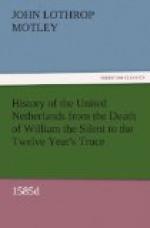The King was willing, however, as Alexander had intimated in his negotiations with Antwerp, and previously in the capitulation of Brussels, Ghent, and other places, that there should be an absence of investigation into the private chambers of the heretics, during the period allotted them for choosing between the Papacy and exile.
“It may be permitted,” said Philip, “to abstain from inquiring as to what the heretics are doing within their own doors, in a private way, without scandal, or any public exhibition of their rites during a fixed time. But this connivance, and the abstaining from executing the heretics, or from chastising them, even although they may be living very circumspectly, is to be expressed in very vague terms.”
Being most anxious to provide against a second crop of heretics to succeed the first, which he was determined to uproot, he took pains to enjoin with his own hand upon Parma the necessity of putting in Catholic schoolmasters and mistresses to the exclusion of reformed teachers into all the seminaries of the recovered Provinces, in order that all the boys and girls might grow up in thorough orthodoxy.
Yet this was the man from whom Sainte Aldegonde imagined the possibility of obtaining a religious peace.
Ten days after the capitulation, Parma made his triumphal entrance into Antwerp; but, according to his agreement, he spared the citizens the presence of the Spanish and Italian soldiers, the military procession being composed of the Germans and Walloons. Escorted by his body-guard, and surrounded by a knot of magnates and veterans, among whom the Duke of Arschot, the Prince of Chimay, the Counts Mansfeld, Egmont, and Aremberg, were conspicuous, Alexander proceeded towards the captured city. He was met at the Keyser Gate by a triumphal chariot of gorgeous workmanship, in which sat the fair nymph Antwerpia, magnificently bedizened, and accompanied by a group of beautiful maidens. Antwerpia welcomed the conqueror with a kiss, recited a poem in his honour, and bestowed upon him the keys of the city, one of which was in gold. This the Prince immediately fastened to the chain around his neck, from which was suspended the lamb of the golden fleece, with which order he had just been, amid great pomp and ceremony, invested.
On the public square called the Mere, the Genoese merchants had erected two rostral columns, each surmounted by a colossal image, representing respectively Alexander of Macedon and Alexander of Parma. Before the house of Portugal was an enormous phoenix, expanding her wings quite across the street; while, in other parts of the town, the procession was met by ships of war, elephants, dromedaries, whales, dragons, and other triumphal phenomena. In the market-place were seven statues in copper, personifying the seven planets, together with an eighth representing Bacchus; and perhaps there were good mythological reasons why the god of wine, together with so large a portion of our solar system, should be done in copper by Jacob Jongeling, to honour the triumph of Alexander, although the key to the enigma has been lost.




